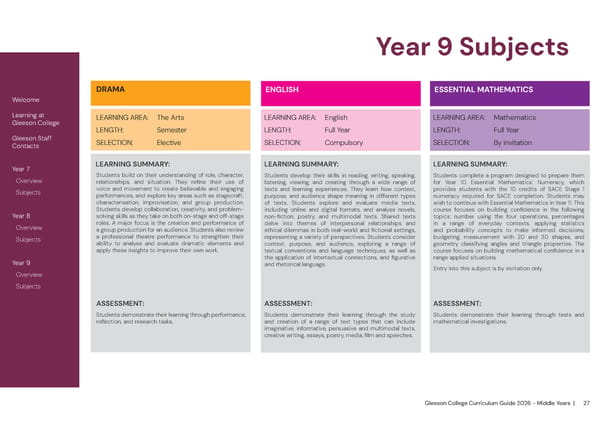Gleeson College Curriculum Guide 2026 - Middle Years | 27 Year 9 Subjects Welcome Learning at Gleeson College Gleeson Staff Contacts Year 7 Overview Subjects Year 8 Overview Subjects Year 9 Overview Subjects DRAMA LEARNING AREA: The Arts LENGTH: Semester SELECTION: Elective LEARNING SUMMARY: Students build on their understanding of role, character, relationships, and situation. They refine their use of voice and movement to create believable and engaging performances, and explore key areas such as stagecraft, characterisation, improvisation, and group production. Students develop collaboration, creativity, and problem- solving skills as they take on both on-stage and off-stage roles. A major focus is the creation and performance of a group production for an audience. Students also review a professional theatre performance to strengthen their ability to analyse and evaluate dramatic elements and apply these insights to improve their own work. ASSESSMENT: Students demonstrate their learning through performance, reflection, and research tasks. ESSENTIAL MATHEMATICS LEARNING SUMMARY: Students complete a program designed to prepare them for Year 10 Essential Mathematics: Numeracy, which provides students with the 10 credits of SACE Stage 1 numeracy required for SACE completion. Students may wish to continue with Essential Mathematics in Year 11. This course focuses on building confidence in the following topics: number using the four operations, percentages in a range of everyday contexts, applying statistics and probability concepts to make informed decisions, budgeting, measurement with 2D and 3D shapes, and geometry classifying angles and triangle properties. The course focuses on building mathematical confidence in a range applied situations. Entry into this subject is by invitation only. ASSESSMENT: Students demonstrate their learning through tests and mathematical investigations. LEARNING AREA: Mathematics LENGTH: Full Year SELECTION: By invitation ENGLISH LEARNING SUMMARY: Students develop their skills in reading, writing, speaking, listening, viewing, and creating through a wide range of texts and learning experiences. They learn how context, purpose, and audience shape meaning in different types of texts. Students explore and evaluate media texts, including online and digital formats, and analyse novels, non-fiction, poetry, and multimodal texts. Shared texts delve into themes of interpersonal relationships and ethical dilemmas in both real-world and fictional settings, representing a variety of perspectives. Students consider context, purpose, and audience, exploring a range of textual conventions and language techniques, as well as the application of intertextual connections, and figurative and rhetorical language. ASSESSMENT: Students demonstrate their learning through the study and creation of a range of text types that can include imaginative, informative, persuasive and multimodal texts, creative writing, essays, poetry, media, film and speeches. LEARNING AREA: English LENGTH: Full Year SELECTION: Compulsory
 2026 Gleeson College Middle Years Curriculum Guide Page 26 Page 28
2026 Gleeson College Middle Years Curriculum Guide Page 26 Page 28